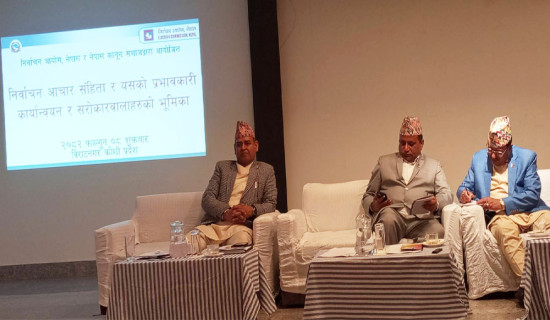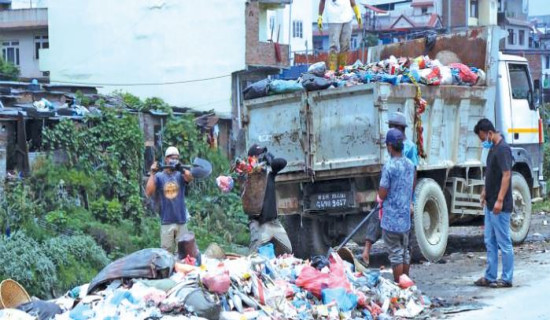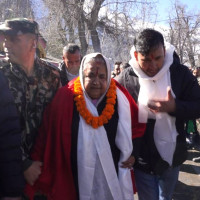- Saturday, 21 February 2026
Civil Service Bill In Jeopardy
The civil service bill has become a subject of intractable political controversy in the political and administrative arena. The conflict has manifested in the controversy related to the cooling-off provision stipulated in the civil service bill. It took a new twist when the two-year cooling-off period provisioned in the bill endorsed by the lower House of the parliament was tampered allegedly with malicious intent, when the final draft was being spruced up to forward to the Upper House of the parliament to defy the spirit of the bill. It was discovered after the bill landed in the upper House of the parliament. A committee has been at work to investigate the matter and nab the culprit.
The senior bureaucrats have accused the political leaders of tampering with the bill, whereas lawmakers point their fingers at the bureaucrats, as the latter are involved in giving the final touch to the provision before forwarding it to the Upper House. Moreover, the matter got murkier when lawmakers in the Upper House from the ruling UML registered an amendment proposal in the bill to reverse the cooling-off period provision. To counter it, CPN-Maoist lawmakers registered an amendment proposal in the bill under consideration to increase the cooling-off period from two years to three years. The cooling-off period provision has given rise to conflicts at different levels, jeopardizing the prospects of the bill. It is expected that the matter will be settled as the probe panel submits its report.
Opposition
The cooling-off period provision in the civil service bill has been opposed ab initio by the senior civil servants. They have contended that the cooling-off period provision is objectionable and hurts their interests. According to senior civil servants, the provision, if passed by the parliament, makes them ineligible and incapacitated to seek any nomination or appointment in public offices for two years following their retirement and release from the civil service obligations. In concrete terms, it shall disqualify them from seeking any appointment or nomination in constitutional commissions, ambassadorial assignments, or other top-level agencies, and therefore bar them from utilizing their knowledge, insights, and experiences gained while serving as civil servants under the tutelage of the government.
It infringes upon their right to pursue options or vocations after they retire from the civil service and are absolved of the discipline and norms applied and enforced as conduct obligations for government officials. However, the rationale behind enshrining this provision in the civil service bill, according to the lawmakers, has been that senior civil servants shall be discouraged from using their position to work at the beck and call of the political masters as an investment in post-retirement rewards. According to media reports, several examples do testify to the fact that senior civil servants did allegedly hobnob with the powerful politicians and secured appointments in powerful and important constitutional commissions and bodies such as the Election Commission, the Commission for Investigation of Abuse of Authority (CIAA) and ambassadorial assignments in key countries abroad.
The pros and cons of the provision were intensely debated in the Governance and State Affairs Committee of the parliament and the cooling-off period was retained in the civil service bill amidst pulls and pressures. A cooling-off period for civil servants is a tool to ensure good governance and integrity. It is prescribed in many democratic countries as a mandatory time interval during which former public officials, after leaving office, are barred from being associated with certain activities, especially joining jobs or lobbying roles that may create a conflict of interest or risk undue influence. It is introduced in many democratic countries in their respective laws, especially the USA, UK, France and even India, to prevent conflicts of interest, reducing the “revolving door” phenomenon characterised by movement between jobs for serving one’s own interests.
Senior civil servants in Nepal need to reconcile to the fact that the cooling-off period provision has been incorporated in the bill to promote integrity, not to transgress their rights and interests. The Civil Service Act should have been enacted immediately after the election held in 2074 B.S. under the federal constitution of Nepal. But this aspect did not receive enough attention by the succeeding governments, as a result of which the implementation of administrative federalism failed to gather speed in the country. There are worries that bureaucracy has been politicised due to their trade union-type associations affiliated to different political parties, which has reinforced their partisan orientation.
Bone of contention
Another major issue that has become a bone of contention is the accountability relationship of the civil servants to the three-tier governments –federal, State (Pradesh) and local. Today, state (Pradesh) and local level key bureaucrats are administered from the Ministry of Federal Affairs and General Administration without any consultation with and concurrence of the state (Pradesh) and local governments, according to the spirit of administrative federalism. As several functions that used to be planned and implemented at the central level have been constitutionally assigned to the provinces and local governments, sub-national capacity to implement newly devolved functions needs to be enhanced.
This capacity can be bolstered only if the adequacy of trained and competent personnel, among others, is provided under the purview of the sub-national government. The top-heavy bureaucratic structures have been kept at the federal level without being recast and restructured. Since the constitution limits the number of ministries and departments at the federal level, the size of bureaucracy will have to be thoroughly downsised through a fresh and rationality organisation and management survey according to the principles of subsidiarity.
(The author is presently associated with Policy Research Institute (PRI) as a senior research fellow. rijalmukti@gmail.com)




-square-thumb.jpg)



-square-thumb.jpg)








